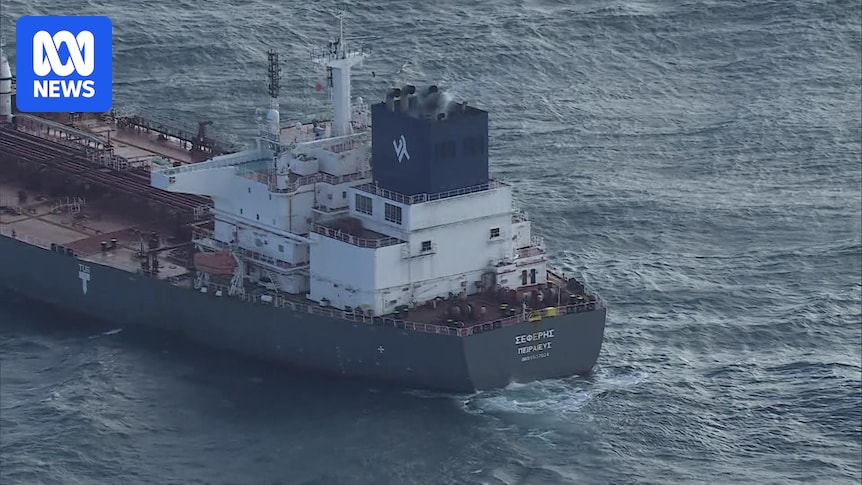
A tanker believed to be carrying fuel derived from Russian oil has docked in Western Australia, highlighting potential loopholes in government sanctions against Moscow. The vessel, Seferis, sailing under a Greek flag, arrived at Kwinana, approximately 40 kilometers south of Perth, early on Wednesday morning after departing India on July 11.
Australia imposed sanctions on Russian oil shortly after the invasion of Ukraine in February 2022. However, India did not follow suit and continues to refine Russian crude oil into liquid fuels such as diesel and petroleum. This situation raises concerns that Australia, by purchasing these products from India, may inadvertently be contributing to the war effort in Ukraine.
Sanction Loopholes and Economic Implications
The core of Russia’s economy is heavily reliant on revenue from oil exports, which has been a significant factor in financing its military operations in Ukraine. While Australia has committed to cutting off this revenue stream, the involvement of third-party countries like India complicates the situation.
John Coyne, Director of National Security at the Australian Strategic Policy Institute, emphasized that although most of Australia’s imported liquid fuel does not originate from India, the issue remains unresolved. “If Australia is to meet its full commitment of applying those sanctions, then it must also ensure that we don’t contribute to a system that washes Russian oil through India,” Coyne stated.
“We don’t know where, how, and what percentage of that goes into our liquid fuel supply chain, so that’s where it gets a bit tricky,” Coyne added.
Potential Solutions and International Comparisons
Coyne suggested that Australia could adopt measures similar to those of the European Union, which has implemented sanctions on refineries using Russian crude oil. “The first step here is making that very clear declaration that Australia will not take liquid fuels that find their origin in Russian oil,” he said, stressing the importance of preventing funds from reaching Russia.
Ukrainian and Australian campaigners claim that Seferis is delivering fuel from India’s Jamnagar refinery. According to the Centre for Research on Energy and Clean Air (CREA), nearly half of Jamnagar’s crude oil feedstock came from Russia in the first half of the year.
CREA’s EU-Russia analyst Vaibhav Raghunandan noted, “This crude is refined into a variety of oil products — gasoline, diesel, jet fuel, etc. Any country importing these products from this specific refinery can expect Russian molecules in them.”
Government Response and Future Actions
In response to these developments, the Australian government has imposed over 1,500 sanctions on Russia, including measures to restrict the import of oil originating from Russia. In June, Foreign Minister Penny Wong announced Australia’s first sanctions against Russia’s “shadow fleet,” which employs various tactics to obscure the origins of its cargo.
Despite these efforts, a spokesperson for Ms. Wong acknowledged the challenges in tracking and monitoring energy products via third countries, stating, “We are evaluating options to place further pressure on Russia’s oil revenues.”
International Law and Diplomatic Considerations
Melanie O’Brien, an associate professor of international law at the University of Western Australia, highlighted the potential for Australia to cut off India from its supply chain. “They can issue sanctions on a particular product and how we import that, which could include banning importing through a third-party state if it can be connected back to Russian oil,” O’Brien explained.
“We need to proof our sanctions to make sure that there isn’t a workaround,” she asserted.
However, John Coyne cautioned that such a drastic move would require careful consideration of its implications, particularly regarding fuel prices and diplomatic relations with India. “At the pump, Australians want to pay the cheapest possible price for liquid fuel,” he said, noting the potential impact on bilateral ties with India.
Conclusion and Next Steps
As the Seferis docks in Kwinana, the Australian government faces the complex challenge of ensuring its sanctions effectively target Russian oil revenues without unintended consequences. The situation underscores the need for robust mechanisms to trace the origins of imported fuels and the importance of international cooperation in enforcing sanctions.
Moving forward, Australia may need to strengthen its regulatory framework and collaborate with international partners to close existing loopholes and prevent the inadvertent funding of conflicts through global oil markets.






